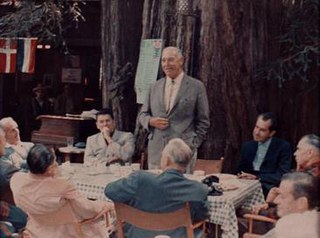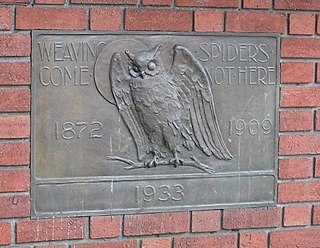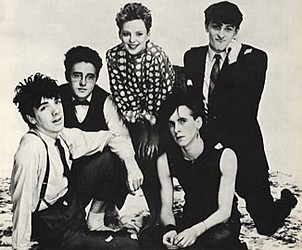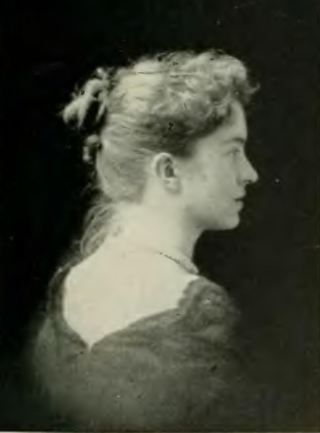The Twilight Club was a dinner club in New York City that operated from 1883 until 1904. It was founded by Charles F. Wingate "to cultivate good fellowship and enjoy rational recreation."

Bohemian Grove is a restricted 2,700-acre campground at 20601 Bohemian Avenue, in Monte Rio, California, United States, belonging to a private San Francisco–based gentlemen's club known as the Bohemian Club. In mid-July each year, Bohemian Grove hosts a more than two-week encampment of some of the most prominent men in the world.

The Bohemian Club is a private club with two locations: a city clubhouse in the Nob Hill district of San Francisco, California and the Bohemian Grove, a retreat north of the city in Sonoma County. Founded in 1872 from a regular meeting of journalists, artists, and musicians, it soon began to accept businessmen and entrepreneurs as permanent members, as well as offering temporary membership to university presidents and military commanders who were serving in the San Francisco Bay Area. Today, the club has a membership of many local and global leaders, ranging from artists and musicians to businessmen. Membership is restricted to men only.
John Patrick was an American playwright and screenwriter.

A gentlemen's club is a private social club of a type originally set up by men from Britain's upper classes in the 18th and succeeding centuries.

Imogen Clare Holst was a British composer, arranger, conductor, teacher, musicologist, and festival administrator. The only child of the composer Gustav Holst, she is particularly known for her educational work at Dartington Hall in the 1940s, and for her 20 years as joint artistic director of the Aldeburgh Festival. In addition to composing music, she wrote composer biographies, much educational material, and several books on the life and works of her father.
The Savage Club, founded in 1857, is a gentlemen's club in London, named after the poet, Richard Savage. Members are drawn from the fields of art, drama, law, literature, music or science.

Boris Karloff (1887-1969) was an English actor. He became known for his role as Frankenstein's monster in the 1931 Frankenstein, leading to a long career in film, radio, and television.

The Cremation of Care is an annual ritual production written, produced, and performed by and for members of the Bohemian Club. It is staged at the Bohemian Grove near Monte Rio, California, in front of a 40-foot tall image of an owl, at a small artificial lake amid a private old-growth grove of Redwood trees.

Leighton Park School is a co-educational independent school for both day and boarding pupils in Reading in South East England. The school's ethos is closely tied to the Quaker values, having been founded as a Quaker School in 1890. The school's ethos is described as achievement with values, character and community. It is one of seven Quaker schools in England.

Altered Images are a Scottish new wave/post-punk band who found success in the early 1980s. Fronted by singer Clare Grogan, the group branched into mainstream pop music, having six UK top-40 hit singles and three top-30 albums from 1981 to 1983. Their hits include "Happy Birthday", "I Could Be Happy", "See Those Eyes", and "Don't Talk to Me About Love".

International Brotherhood of Magicians (I.B.M.) is an organization for both professional and amateur close-up and stage magicians, with approximately 15,000 members worldwide. The headquarters is in St. Charles, Missouri. There are over 300 local groups, called Rings, in more than 88 countries, largely concentrated in cities of the United States and Canada. The organization publishes a monthly periodical entitled The Linking Ring, which features tricks, coverage of shows and events in the magic community, and interviews with magicians.

Lawrence Wheaton Gates was an American actor.

Young's Hotel (1860–1927) in Boston, Massachusetts, was located on Court Street in the Financial District, in a building designed by William Washburn. George Young established the business, later taken over by Joseph Reed Whipple and George G. Hall. Guests at Young's included Mark Twain, Elizabeth Cady Stanton, William Lloyd Garrison, Charles Sumner, Rutherford B. Hayes, and numerous others.

The Beaver Club was a gentleman's dining club founded in 1785 by the predominantly English-speaking men who had gained control of the fur trade of Montreal. According to the club's rules, the object of their meeting was "to bring together, at stated periods during the winter season, a set of men highly respectable in society, who had passed their best days in a savage country and had encountered the difficulties and dangers incident to a pursuit of the fur trade of Canada". Only fragmentary records remain of their meetings, but from these it is clear that the Beaver Club was "an animated expression of the esprit de corps of the North West Company". The men of the Beaver Club were the predecessors of Montreal's Square Milers.

With this motto, "The measure of the worth of an organization to its community, is bound in its ability to embrace opportunities for service" the Twentieth Century Club had its beginning in 1894. Mrs. Walter McNab Miller served as President for an original group of 84 women. The Club's name was chosen to reflect a look forward to the future and the beginning of the new century.

Pasadena Republican Club (PRC) is the oldest, continuously active Republican political club in America, founded on March 29, 1884, 139 years ago. Every two years for the last 138 years the Pasadena Republican Club has operated the Greater Pasadena Area Republican Headquarters in Pasadena, California with the help of volunteers. Greater Pasadena Area Republican Headquarters supports the towns in the west side of the San Gabriel Valley. Pasadena Republican Club works closely with Republicans running for office of the California's 41st State Assembly district.

The Woman’s Literary Club of Baltimore (1890–1941) grew out of the tradition of women’s clubs that flourished in late nineteenth-century America. A number of literary societies founded throughout the country during this time provided women a chance to read and discuss literature in a supportive setting. These clubs originated to fill a void left by the limited educational opportunities for girls. The Women's Literary Club of Baltimore differed from the majority of women's clubs, however, in focusing on getting their work published. The group provided mutual support for one another, not just in their study of literature but to support each other’s efforts in pursuing literary careers. Over the course of its existence, hundreds of works by Club members were published in magazines, newspapers, and by major book publishers.
The Johannesburg North Reformed Church/Andrew Murray Congregation is a bilingual congregation of the Dutch Reformed Church in South Africa (NGK) in the Johannesburg suburb of Orchards. It was formed in 1999 by the merger of the NGK congregation and the Andrew Murray Congregation and functions as a church without borders.

The Aesculapian Club of Edinburgh is one of the oldest medical dining clubs in the world. It was founded in April 1773 by Dr. Andrew Duncan. Membership of the Club is limited to 11 Fellows of the Royal College of Physicians of Edinburgh and 11 Fellows of the Royal College of Surgeons of Edinburgh. 'Extraordinary Membership' is given to members aged over 70 years. The Club was established during the Scottish Enlightenment to encourage convivial relations between Fellows of the two Colleges and to stimulate intellectual discussion. The Club dinners are held in the New Library of the Royal College of Physicians of Edinburgh on the 2nd Friday of March and October each year. The principal guest at each dinner is invited to give a short talk on a non-medical subject and this is followed by a round-table discussion.















